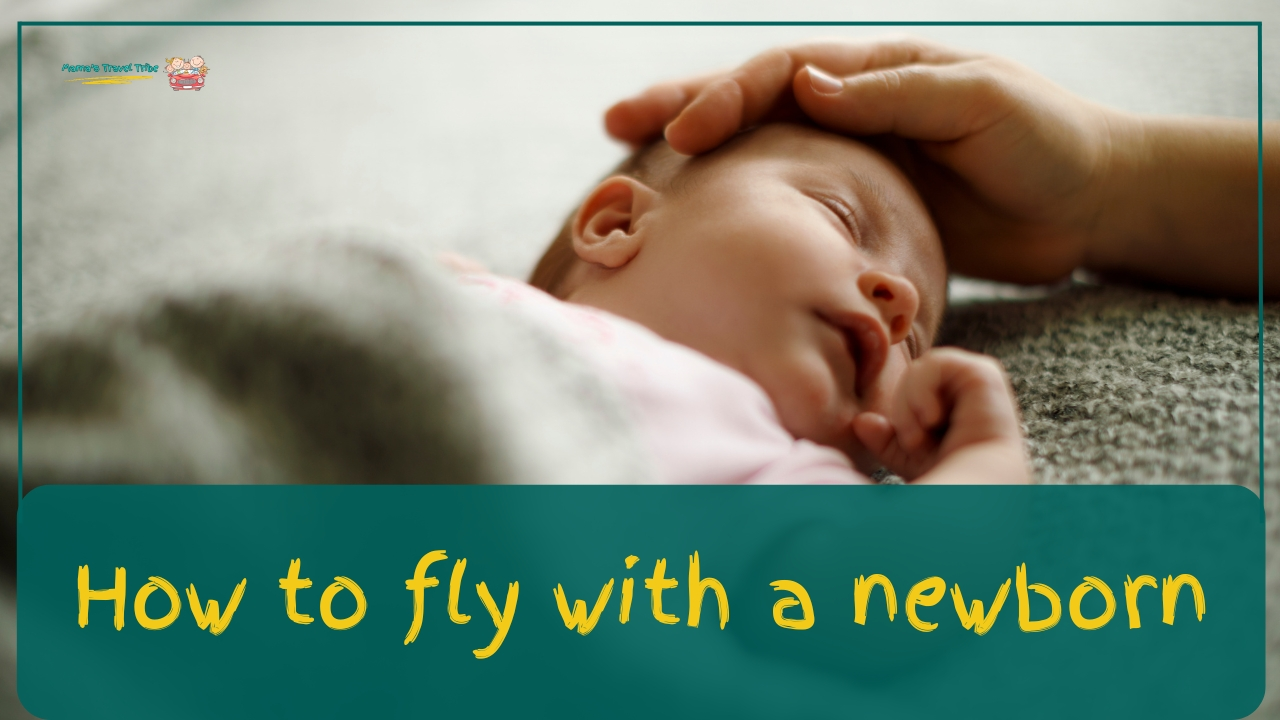“How to fly with a newborn?” is a question that concerns many first-time parents. The good news is that it’s easier than you think because you will need to pack things wisely and just stay relaxed. Worry not. From packing essentials to handling airport security, I’m explaining everything in this guide.
How to Fly With a Newborn? (The Ultimate Guide)
To fly with a newborn, choose flights that match your baby’s sleep schedule and bring essential items like diapers and baby food. You should also feed the baby during takeoff and landing to help with ear pressure. Furthermore, stay calm and use soothing techniques to manage crying.
Prepare for the Flight
First things first, make sure your baby is healthy enough to travel. If your newborn has any respiratory issues or other health concerns, it’s best to consult your pediatrician. They can tell you if it’s safe for your baby to fly or if you should delay your trip.
When booking your flight, try to choose times that match your baby’s sleep schedule. I find that flying during nap times or at night can help keep your baby calm and relaxed. Moreover, direct flights are your best friend when traveling with a newborn.
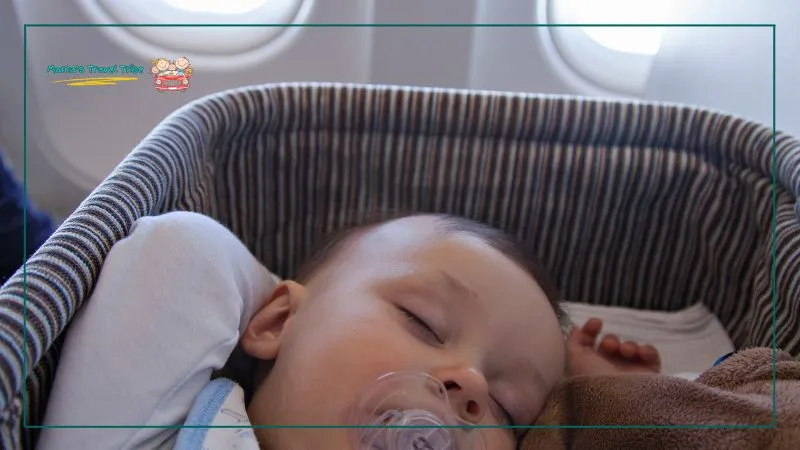
Note that many airlines offer bassinets for babies on long-haul flights. These are usually available in bulkhead seats, which have more space. When booking your ticket, ask the airline about bassinet options. Having a bassinet can give your baby a safe and comfortable place to sleep, making the flight more manageable for you.
Pack Wisely
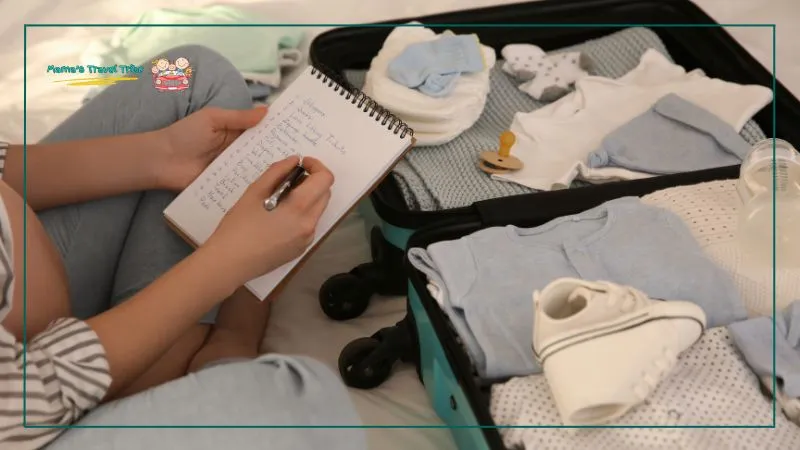
Packing wisely is essential when traveling with a newborn. I always make sure the diaper bag is fully stocked. You’ll need diapers—plan for one for every hour of travel, plus a few extras just in case. Wipes are a must, and I never forget changing pads to keep things clean. Baby cream or ointment is also essential to prevent any diaper rash during the trip.
Feeding time can be challenging on a plane. If you’re bottle-feeding, pack enough bottles and formula or breast milk. Remember to check the airline’s regulations for carrying liquids.
Don’t forget the paperwork! If you’re flying domestically, a birth certificate might be enough. People also ask, “How to fly internationally with a newborn?” For international travel, note that your kid will need a passport.
Always check the airline’s requirements before you travel. Some airlines also require proof of age for lap infants under two years old, so having these documents handy is crucial.
Here are some other things I suggest:
| Essential Items | Description |
| Baby’s Change of Clothes | For handling spit-ups and diaper leaks |
| Parent’s Change of Clothes | To manage any accidents involving the baby |
| Blankets | To keep the baby cozy |
| Favorite Toy/Pacifier | To provide comfort to the baby |
| Swaddle/Baby Carrier | To keep hands free while keeping the baby snug |
| Hand Sanitizer | To keep hands clean and germ-free |
| Disinfectant Wipes | To clean surfaces and items on the go |
| Baby-Safe Pain Relievers | For unexpected pain relief needs |
| Necessary Medications | Any medications the baby might need |
Arrive At the Airport
I always make sure to arrive at the airport early when traveling with my baby. This gives me extra time for check-in, security, and boarding. Airports can be unpredictable, and having some extra time can reduce stress. If your airline offers family pre-boarding, take advantage of it. It’s great to have a few extra minutes to get settled on the plane without feeling rushed.
Security screening with a baby can be a bit tricky, but knowing what to expect can help. You’ll need to carry your baby through security, so be prepared for that. The good news is that baby food, formula, and breast milk are allowed. However, they must be in reasonable quantities.
Important Point: Just let the security officers know you have these items, and they’ll guide you through the process.
Getting around the airport can be easier with a stroller or a baby carrier. I prefer using a baby carrier because it keeps my hands free and my baby close. Furthermore, make sure to locate family restrooms—they’re a lifesaver for diaper changes and offer more space and privacy.
Stay Relaxed On the Flight
Staying relaxed on the flight is all about preparation and being flexible. When boarding the plane, I recommend gate-checking your stroller or car seat if necessary. This way, you’ll have them until the very last moment.
Once you’re on the plane, settle in. You can also talk with others to lighten your mood.
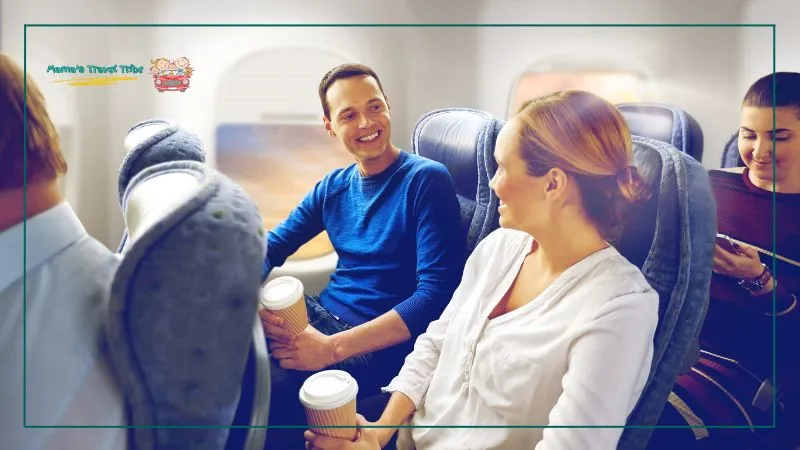
You should also organize your essentials within easy reach. Having everything you need close by will make the flight much smoother.
Keep in mind that takeoff and landing can be tough on a baby’s ears due to the pressure changes. I always feed my baby during these times to help alleviate the discomfort. If feeding isn’t an option, using a pacifier can also help. The sucking motion can ease ear pressure and keep your baby calm.
Keeping your baby comfy on the flight is important. Feed your baby often to keep them hydrated. If they get fussy, walk up and down the aisle and gently bounce them – the movement helps soothe them. Use a bassinet if the airplane has one for a safe and cozy sleeping spot.
After the Flight
When the plane lands, it’s often helpful to let other passengers disembark first if you need more time. This way, you can gather your things without feeling rushed. Once you’re off the plane, don’t forget to retrieve your stroller or car seat if you checked it at the gate. Having these items will make it much easier to move through the airport with your baby.
After you’ve collected your luggage and settled in, give yourself and your baby some extra time to adjust to the new environment. Traveling can be tiring for both of you, so a little patience goes a long way.
Again, please stick to your baby’s routine as much as possible. Keeping familiar nap times, making proper beds, and following bedtime rituals can help your baby feel more secure and ease the transition to the new place.
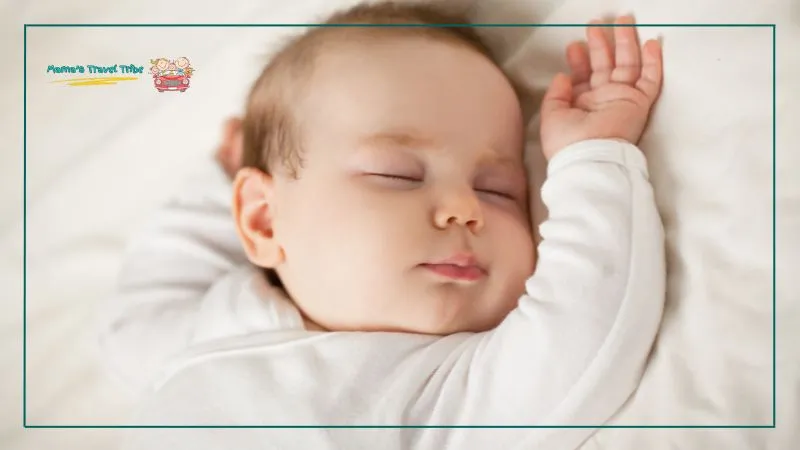
How Safe Is It to Fly With a Newborn? Find Out
Flying with a newborn can be safe if you take the right precautions. Many parents worry about the potential risks, but with careful planning and understanding of safety measures, you can ensure a comfortable journey for your baby.
Careful planning involves:
- Checking airline policies for infants to know what to expect.
- Booking direct flights to minimize travel time and avoid layovers.
- Scheduling flights during sleep times to help your baby sleep through the journey.
- Packing essential items like diapers, wipes, formula, and a change of clothes.
- Bring favorite toys or blankets to soothe your baby.
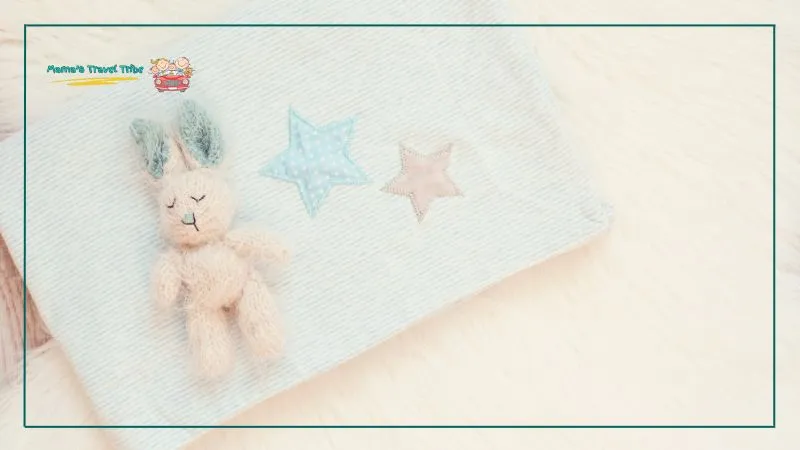
Understanding safety measures includes:
- Ensuring your baby is healthy and has pediatrician approval to fly.
- Protecting your baby’s ears during takeoff and landing by feeding or using a pacifier.
- Keeping your baby hydrated to avoid dehydration from the dry cabin air.
- Washing hands frequently and using hand sanitizer to reduce infection risk.
- Using a car seat if your baby has their own seat for added safety.
FAQs
How Long Should You Wait to Fly With a Newborn
Most airlines allow newborns to fly as early as 2 days old, but it’s generally recommended to wait until the baby is at least 2 weeks to 1 month old. This allows time for initial check-ups and vaccinations. Always consult with your pediatrician before flying to ensure the baby is healthy enough for air travel.
How do I Get my Toddler Through TSA?
To get your toddler through TSA, ensure you have all necessary documentation, such as a boarding pass and identification if required. Use family lanes if available for a smoother process. Keep your toddler in a stroller until you reach the security checkpoint, where you’ll need to carry them through.
Also, pack liquids and snacks in accordance with TSA guidelines and prepare for any additional screening procedures.
Do Infants Need a Boarding Pass?
Yes, infants need a boarding pass even if they are traveling as lap children and not occupying a separate seat. You must inform the airline when booking to ensure the infant is added to your reservation. The boarding pass helps the airline keep track of the number of passengers and ensures the infant is accounted for during the flight.
How to Fly With a Newborn 2 Weeks Old?
Flying with a 2-week-old newborn requires careful preparation. Ensure your baby is healthy and has pediatrician approval. Pack essential items like diapers, formula, and blankets. Choose a direct flight if possible, and ensure your baby is comfortable and safe throughout the journey.
Conclusion
Traveling with a newborn doesn’t have to be stressful. Here are the key points:
- Get to the airport early to have plenty of time for check-in and security.
- Pack a diaper bag with all the essentials you’ll need for the trip.
- Feed your baby during takeoff and landing to help with ear pressure.
- Use a stroller or baby carrier to move around the airport easily.
- Keep to your baby’s routine as much as possible once you arrive.
By following these tips, you can ensure a smooth and comfortable flight for you and your little one.

